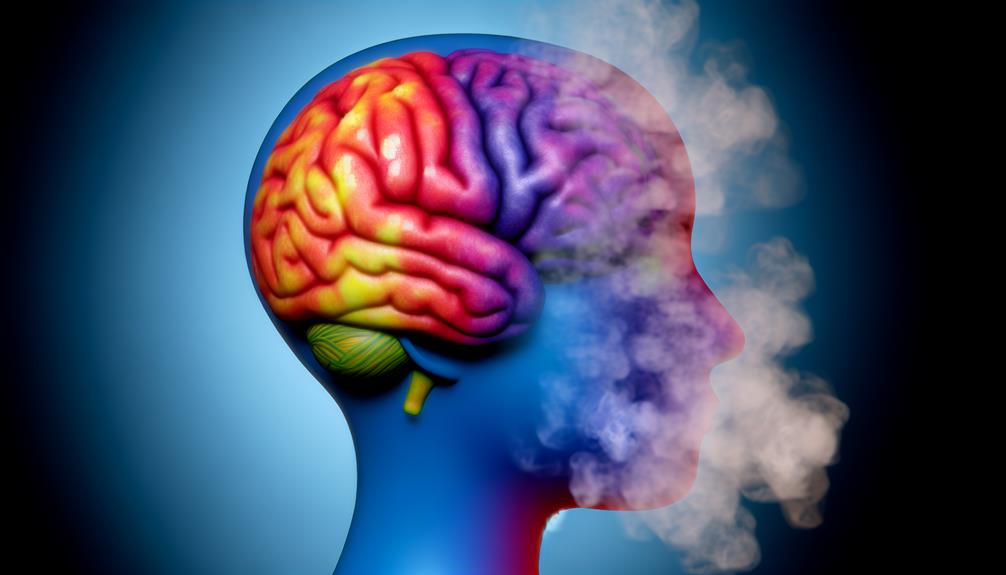As you navigate the complex landscape of marijuana-induced cognitive decline, the interplay between memory and learning emerges as a pivotal focal point.
Have you considered how this interaction could shape your understanding of the effects of cannabis on cognitive functions?
The insights on brain development in adolescents and the potential for long-term cognitive impairment provide a nuanced perspective that may shift your perceptions in unexpected ways.
Intriguing connections await exploration as you delve into these three key insights.
Table of Contents
3 Best Insights on Marijuana-Induced Cognitive Decline:
Impact on Memory and Learning
Marijuana use can detrimentally affect memory and learning abilities in individuals. When you consume marijuana, it can interfere with the normal functioning of your brain, particularly in areas related to memory formation and learning processes. As a result, you may experience difficulties in retaining new information or recalling previously learned material. This impact on memory can be especially problematic in academic or work settings where cognitive functions are crucial for success.
Furthermore, marijuana’s influence on learning abilities can hinder your capacity to acquire new skills or knowledge efficiently. Your brain’s ability to process and store information may be compromised, leading to slower learning curves and decreased performance in tasks that require cognitive flexibility and problem-solving skills. These effects can be particularly concerning for students or individuals in professions that demand continuous learning and adaptation.
RELATED ARTICLE: What Impact Does CBD Have on Arthritis Discomfort?
Brain Development in Adolescents
Impacts on memory and learning aside, understanding how marijuana affects brain development in adolescents is crucial for comprehending the full scope of its cognitive consequences. During this critical period of growth, the brain undergoes significant changes that can be influenced by external factors like marijuana use.
- Neuroplasticity: Adolescence is a time of heightened neuroplasticity, where the brain is more adaptable to environmental input. Marijuana use during this stage can disrupt normal brain development processes, potentially leading to long-term consequences.
- Cognitive Functions: The prefrontal cortex, responsible for decision-making and cognitive control, is still developing in adolescents. Marijuana use can interfere with the maturation of this brain region, affecting functions like impulse control and working memory.
- Risk of Addiction: Adolescents who use marijuana are at increased risk of developing substance use disorders later in life. The impact of early marijuana use on the developing brain may predispose individuals to addictive behaviors. It’s essential to consider these factors when evaluating the risks associated with adolescent marijuana use.
Long-term Cognitive Impairment
Amid concerns about cognitive function, the enduring effects of prolonged marijuana use on mental acuity warrant closer examination. Long-term cognitive impairment resulting from chronic marijuana consumption is a subject of growing interest. Research indicates that extended use of marijuana can lead to deficits in cognitive abilities such as memory, attention, and executive function. These impairments may persist even after discontinuing marijuana use, highlighting the potential long-lasting impact on cognitive performance.
Studies have shown that heavy marijuana use over an extended period is associated with decreased cognitive function, particularly in tasks requiring complex cognitive processing. This suggests that the effects of marijuana on cognitive abilities may not be fully reversible and could have lasting consequences on daily functioning. It’s essential to consider these potential long-term cognitive impairments when evaluating the risks of marijuana use, especially for individuals who use the drug regularly or starting use at a young age. Further research is needed to fully understand the mechanisms underlying marijuana-induced cognitive decline and to develop effective interventions to mitigate these effects.
Frequently Asked Questions
Can Marijuana Use Lead to Changes in Personality or Behavior Over Time?
Yes, marijuana use can lead to changes in personality or behavior over time for some individuals. It’s important to be aware of how cannabis can impact you and to seek professional advice if concerned.
Is There a Correlation Between Marijuana Use and Increased Risk of Mental Health Disorders?
Using marijuana may increase your risk of mental health disorders. It’s essential to consider potential consequences before use. Seek professional guidance if you’re concerned about how marijuana could impact your mental well-being.
How Does Marijuana Consumption Affect Decision-Making Abilities in Adults?
When you consume marijuana, your decision-making abilities may be impacted. It can affect your judgment, leading to potential risks when making choices. Be aware of how it influences your cognitive functions and consider the implications.
Are There Any Natural Remedies or Strategies to Counteract the Cognitive Decline Associated With Marijuana Use?
To counteract cognitive decline linked to marijuana use, explore natural remedies like exercise, adequate sleep, and a balanced diet. Engaging in cognitive activities, setting limits on use, and seeking professional guidance can also be beneficial.
Can Marijuana-Induced Cognitive Decline Be Reversed or Improved With Lifestyle Changes or Interventions?
You can potentially improve marijuana-induced cognitive decline with lifestyle changes. Exercise, healthy eating, quality sleep, and cognitive activities may help. Consult a healthcare professional for personalized advice on managing cognitive function while using marijuana.
Conclusion
Overall, it’s clear that marijuana use can have a significant impact on cognitive function, particularly in the areas of memory, learning, and brain development in adolescents.
Long-term use can lead to lasting cognitive impairment. It’s important to consider these insights when making decisions about marijuana use, especially for those who are still developing mentally.
Prioritizing brain health and making informed choices is crucial for maintaining cognitive function in the long run.




